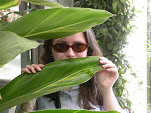What does your horticultural practice look like?
‘Horticultural practice’ is concept I’m suggesting to describe a mindset of being invested and committed to your plant hobby. How it looks will be unique to each of you, but will have one common factor: a pattern of increasing success through discovery. It is a mindset you can use to level up your game, no matter what your current level is.
I’m borrowing this concept from the term ‘art practice.’ Artists often talk about their art practice. This is all the things one does to stay fresh and active in their field, similar to a medical practice. It isn't as simple as cranking out the next painting. Instead, it is the path of exploration, discovery, learning new techniques, personal challenges, and overall continuing education that enables supporting and improving the production of new art, in the case of an artist. Basically it’s all about going beyond just the production aspect. You can imagine how with growing plants, you can have a similar concept, though it isn’t often named as such.
So how can we think about horticultural practice? What might that include?
Obviously it can be the every day work of caring for your plants. It also includes reading about various plants or plant-related topics, joining various plant groups with online chat or in person lectures, as well as trying things out for yourself. To get the most of the effort invested, though, make sure to practice with purpose.
A great purpose to start with is investigating problems that arise - really pursue it to get to the bottom of it. We have an instinct to look for an easy answer, or try things “just in case”, but that doesn’t really teach you to see it before it happens next time, and worse, may involve spraying chemicals that aren’t going to do any good. Push beyond to figure out exactly what is happening and why it might have happened. Use google image and website searches, and be picky about your references. Maybe hit up the library! This will lead to a more informed choice for solving the problem, but may also lead you to general improvements in how you care for your plants on a daily basis, so preventing this from arising again.
Side note, the above is the path that led me to switch to using reverse osmosis water only. If you’re interested, I can expand on that another time; leave me a comment below.
Or perhaps you like succulents, and you’d like to know how to grow better looking plants, consistently. How might you do that? You can certainly start with talking to other people who keep succulents, but that only gets you as far as the knowledge they’ve gained and whatever assumptions they’ve made about the question you’re asking. So as a next step, you might research individual plants. Where are they from? What is the climate like there at different times of the year? Make it your personal challenge to find someone on instagram that posts photos of those kinds of plants in their native habitat. Can you tell if they’re in shade? Always on a slope? What other kinds of things grow nearby? Maybe visit or look at photos from botanical gardens. How do they situate the plants?
For myself, I find there is nothing that changes my perceptions about plants more than seeing photos of them in the wild. I’ll never be able to travel to find all the things in their native habitat, but if you see and hear enough talk about those places, you gain an appreciation of what its like. This will change the way you manage your plants. As a bonus, its like arm-chair travel!
Yes, all that is lovely but why bother with all that when you can just get someone to tell you what to do?
Well, actually, that is part of it. That is often really useful, a great starting point. Instead what I’m saying is more on the lines of ‘always dig deeper.’ There are a number of reasons for this. One, for example: you post a photo on facebook and ask what is wrong. Folks will make assumptions about your growing space, habits, water quality, and overall what is happening in your windows. They also have to operate under the limitations of their own experience or reading, and so may miss things, all good intentions aside. So you might get some good answers, you might get some incomplete, and in both cases, you may still not know *why*. A combination of the effort to get into the details, making notes for yourself, and that feeling of “this is it!” is what usually makes something truly stick in your mind. Plus, it is just fun. So, yes, chatting with plant friends is a starting point, but there is so much more you can discover.
At the end of the day, if the goal of the hobby is to get stress relief, gain enjoyment, gain a sense of accomplishment…its hard to get that by chance. Most people get that sense of fulfillment when they get to the other side of ‘conquering a mountain’, if you follow the analogy. Meaning, the journey of discovery, solving a mystery, the expansive feeling of sheer wonder and awe - that is where you will find joy. So get out there and explore!
Enjoy your personal journey!

